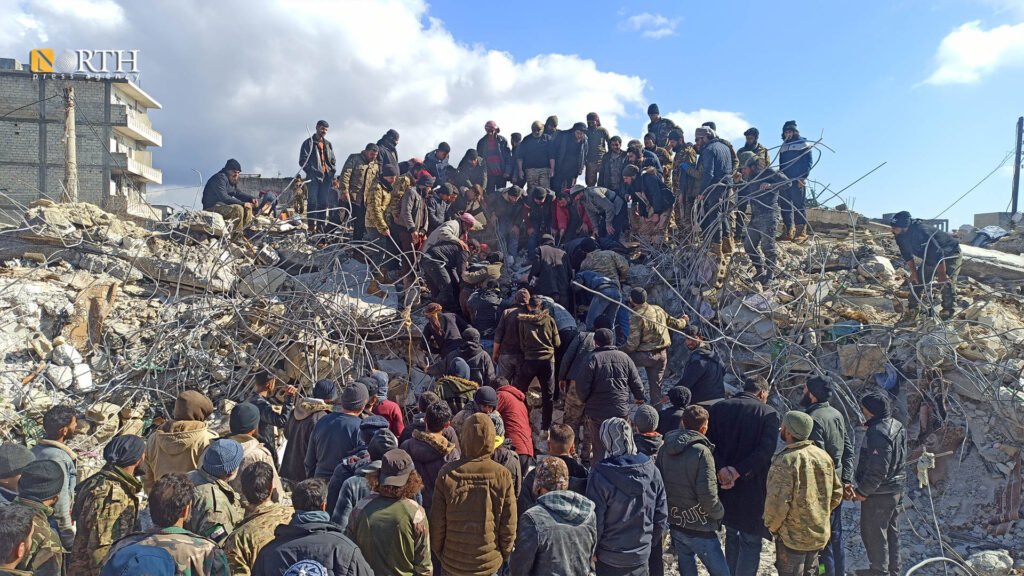DAMASCUS, Syria (North Press) – Lodi cannot sleep or be away from her baby. She has kept him in her arms and slept by the door since the earthquake.
Lodi Muhammad, 40, a housewife living in the coastal city of Tartus, told North Press, “I am plagued by non-stop hysterical crying spells at night.”
The deadly earthquake, which hit southern Turkey and northern Syria on Feb. 6 at dawn, leaving thousands of casualties, has also left its mark in a variety of psychological disorders throughout the country. Many Syrians are plagued with different fear-induced behaviors, such as restlessness at night. Children of different ages have begun acting abnormally in the wake of the earthquake.
According to official statements of the Syrian government, the Syrian opposition, and the Autonomous Administration of North and East Syria (AANES), the earthquake’s toll in Syria has reached 3.694 dead and 14.806 injured.

Search operations for survivors in Jindires in Afrin countryside – North Press
The United Nations stated that the number of fatalities in northwest Syria alone has reached 4.300 dead and 7.600 injured, whereas UN authorities expect the final death figures to double.
Post Trauma
Mudar Muhammad, 37, from Latakia, has kept silent and not communicated with anyone around him since dawn on Monday, Feb. 6.
All he thinks about is how he could have survived the earthquake living in an area marked by makeshift constructions. He said, “I felt the entire building shaking. I feel like I will die at any moment. I do not think about the future anymore.”
Ranim Mustafa, 25, from Damascus, draws a comparison between how war and the earthquake has affected them.
“When the shelling would cease we used to feel relieved as we hid in our houses. Now it feels like death is always chasing us,” Mustafa said.
Mustafa grows restless at night. “I cannot sleep at night anymore, as if earthquakes only happen at night,” she continued.
Every time she recalls the details of the night of the earthquake, she is overwhelmed by uncontrollable laughter, ending in a crying spell. Most people around her just cry.
Shortly after the earthquake hit, many psychiatrists volunteered to help the affected. Ali al-Ali (pseudonym), 35, a psychiatric doctor in Damascus, said that “after a disaster or trauma, psychological disorders generally increase, which has been the case in Syria during the years of war.”
“Following the earthquake, these disorders intensified, particularly acute Post-Traumatic Stress Disorder (PTSD), which lasts for months,” al-Ali said.
“Panic, stress, and depression disorders are clearly visible in people,” the doctor said, adding, “the difference is that it is more physically evident in adults than children because children show fewer facial expressions, but it is reflected in their ability to concentrate.”
Nuha Issa (pseudonym), 38, a psychiatrist from Damascus, said that she “saw many cases of survivors guilt, especially among teenagers who felt guilty of being alive while so many others died; they feel helpless.”
This is a fear-induced condition transformed into anxiety, and if it lasts more than two weeks, it develops into depression, which requires medication, according to Issa.
The doctor noted that the earthquake evidently affected many women, as they “stopped preparing food and looking after their families.”
This condition is described as “advanced acute PTSD. It lasts three weeks; if it lasts longer, consultation with a psychiatrist is required.”
The doctor and the specialist agree that psychotherapists in the earthquake-affected areas should be subjected to “supporting the supporter” programs, and it is preferable that “they do not treat the people of the area, because they have experienced the same trauma.”

